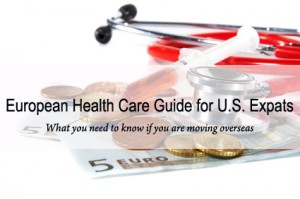European Health Care Guide For US Expats
Information about European Health Care for US Residents
One of the biggest changes you will encounter when moving abroad is health care. European health care is very different than the United States’ healthcare system. Before deciding to move abroad, review the health care system of your new country. Prepare to adjust your previous assumptions about health care services in Europe compared to America.
To begin, you must keep in mind that not all countries in Europe use the same health care system. Although European health care seems like a whole coverage for the EU, every country has its own independent system.
You can begin by assuming that taxation will be very high on the other side of the pond and that there may be universal health care in countries you move to. Germany is a well known European country that has the world’s oldest national health care system.
The Netherlands is an example of a country that has a dual-level system. Long term care that includes taking care of the elderly and the mentally ill is covered socially while all primary care including doctors and hospital visits is covered privately. Overall, Europe’s health system is a large bonus when moving there. A lot of expats choose to move to Europe because of this exceptional quality and it’s important to have knowledge of this system before your move.
Publicly Funded Insurance
A lot of countries in Europe offer publicly funded health insurance. Taxation is the primary means to cover cost and everyone has the option for health care no matter what their situation. Depending on the country, social health care can cover part of or all of prescription medication. In the Netherlands, you must take out a basic level of insurance as an expat within four months of moving to the country. Expatica.com explains that companies cannot refuse coverage no matter what your age or health status. The federal government funds these companies in this situation.
Another country that covers your health care is France. France is one of the best countries in the world for health care and if you work, you will receive all of your health care free. In France, typically 20% of an individual’s gross salary goes toward social security costs which include health care.
Switzerland is a great destination because health care is exceptional. Once you move to Switzerland, you must get health insurance within the first three months of living there. On average, 8% of your income will go towards your health care. Additionally, in Switzerland, each individual family member must be covered and you can’t use umbrella coverage. Depending on your country, you can change your insurance plans about once a year and can also supplement them with private insurance if needed.

Health Care in Europe info for US citizens moving overseas
Private Insurance
Private insurance is taken out by those in European countries that need specialty care when not offered for free. In the Netherlands, you will need private insurance to cover doctors visits and specialty visits.
Differing is France which covers all medical occurrences such as dentistry. In France, some individuals choose to purchase private insurance to cover the percentage the government does not cover for prescriptions. Usually this percentage is pretty low such as 35-60%. A lot of people visit France from other countries and pay privately for the top hospitals in the world. In Switzerland, you can purchase private health insurance but it comes at a very high price. Once you move to your new home abroad, you can learn more in depth about your countries’ policies and determine if you would like to purchase private insurance for you and your family.
Health Care Specialists
Some countries will cover specialty health services such as dermatology appointments and psychiatrist visits while others only cover basic doctors office visits. Unfortunately, in the Netherlands specialists are extra and you can take out private insurance to cover them. France is considered top tier because all specialist appointments are free of charge including psychiatry and dentistry. It is really important when moving to a new country to ask what specialty services are included in your health care and which ones aren’t.
Overall Healthcare
Overall, health care in Europe is making huge advances compared to the United States. When moving, you should look into your countries health care system and determine what will be publicly funded, if you should supplement it with private insurance and which specialty health care services are offered. If you determine these three things, you’ll be on your way to embracing your new countries health care system in no time.
More Info

![]()
Schumacher Cargo Logistics utilizes insured, secured and bonded facilities. We provide warehousing, packing, crating, trucking and loading services out of our own warehouses here in the USA – Los Angeles, Houston, Savannah, Miami, New York, and New Jersey. All other worldwide destinations are covered by our affiliated organization member companies.
Why Do Americans Travel to Other Countries for Medical Care?
Many factors currently contribute to the growing number of Americans who are traveling to other countries for certain medical procedures. Some are motivated out of necessity, while others choose to do it purely based on personal preference. There are plenty of good reasons to seek medical intervention in other countries and there is minimal risk as long as patients plan their trip well and research their destination carefully. Aside from possible travel difficulties, going abroad for healthcare also means receiving treatment that isn’t necessarily subject to the same regulatory or enforcement oversight found in the United States.

Access to Restricted Treatment
Modern countries have many things in common when it comes to laws and regulations, but some of the small differences can be huge for some people. In some cases, people travel abroad to participate in trials or new treatment that hasn’t been cleared for use in the US yet. Others visit foreign nations for surgeries, procedures or medications that they can’t get in their homeland. Seeking this kind of treatment is hazardous, but can be worth it if there are no other options available.
Reduce Medical Costs
One of the main reasons why people in the United States consider foreign medical intervention is affordability. According to data gathered in 2017, over 10 percent of Americans can’t afford a personal health plan, according to Insider. People who have minimal or no insurance can face high costs even from standard levels of care that can quickly cripple an average household’s finances. Even Americans with health insurance may travel for financial reasons if the procedure they want is not covered by their policy. Optional procedures, like cosmetic surgeries, are prime candidates for medical traveling.
Seeking Specialist Services
Even though the United States is one of the largest nations and has one of the most robust healthcare systems in the world, the high level of specialization required for some treatments necessitates crossing the border. Some diseases or treatments are so specific or difficult that only a handful of people on the planet can address them. There are also plenty of niche clinics, hospitals and other medical establishments that cater to specific needs, which may not be available domestically.
Privacy or Preference
People who have achieved a great deal of wealth, fame or notoriety may travel overseas for certain types of procedures. Business executives and political candidates may pursue this option out of a need for confidentiality, as public awareness of the procedure could jeopardize their professional interests. Celebrities and other people who are widely-known may simply want to recover in peace and privacy at a location where they are not readily recognizable.
Whether they feel like their best chance for recovery is in a foreign facility or they don’t have the money to cover costs of domestic care, thousands of Americans leave the country to seek health services every year. While there’s nothing intrinsically wrong with this kind of travel, patients should carefully consider the possible risks and challenges that their decision will bring.
European Health Insurance Options
 Health Insurance in Europe for Immigrants and Expats
Health Insurance in Europe for Immigrants and Expats
With so much of Europe unified – from trade agreements to currency – it’s not surprising that expats and tourists expect that there is a European system of healthcare as well. But, surprisingly, there is not. There is no “European medical insurance” system per se. Healthcare remains the responsibility of each individual country. The majority of countries offer universal health care, primarily administered through socialized medicine or a multi-payer system. The overall standards of care are very good – in some cases, outstanding. And all European countries boast high life expectancy, low infant mortality, and good access to physicians, pharmacies, hospitals, and clinics.
Which European Countries Offer the Best Health Insurance?
The majority of European countries have similar standards of care. However, there are some gaps between the western and Nordic areas and the southern and eastern parts of Europe. In the top 7 healthiest countries (Switzerland, Netherlands, Norway, Denmark, Belgium, and Finland, according to the 2018 Euro Health Consumer Index), the standards regarding wait times, accessibility, and preventative care far outstrip the scores from those at the bottom of the list (Poland, Hungary, Romania, and Albania). A rural clinic in Albania may feel very rustic indeed compared to an urban hospital in Denmark. However, on the whole, visitors and expats receive excellent care.
Some more detailed health information in the following regions:
The EU Has Some Policy Powers
While the European Union isn’t responsible for providing healthcare, it does pass laws which do affect healthcare and health standards. For instance, the EU is responsible for laws regarding food safety, consumer rights, and anti-smoking regulations. So while it doesn’t have a hand in, say, wait times in French hospitals or the number of pediatricians in Spain, it does play a strong role in influencing public health, public safety, and environmental standards.
How Does Medical Insurance Work in Europe
There is a strong spirit of cooperation that ensures that European citizens can access emergency healthcare services when they are visiting neighboring countries. All European Union member states, plus some additional non-member countries, offer their citizens a European Health Insurance Card.
The EHIC card allows for reciprocal emergency medical treatment when the holder is visiting another European country. It does, however, come with some limitations. It doesn’t include coverage for elective services. And it also excludes any care that can safely wait until you return home. It’s not appropriate coverage for when you travel to another country specifically to receive healthcare, perhaps enticed by a particular treatment program or specialty clinic. It really is designed just to provide emergency care at little to no extra cost to the European patient.
To be eligible, it’s not enough to hold a European passport. You have to be a legal resident who is eligible for healthcare services in whatever country you reside in. If you’re an expat who has local healthcare insurance, this includes you. However, if you rely exclusively on private international care, you wouldn’t be eligible and therefore should carry traditional emergency medical travel insurance.
Insurance Plans for Travelers to Europe
Travel Medical Plans offer visitors to Europe less comprehensive cover at a more affordable price. Read about Europe Travel Insurance for those of you traveling to the following countries:
If you are traveling outside of Europe, make sure you have a travel insurance plan to cover you while abroad.
Health Insurance for Expats and Foreigners Living in Europe
Assuming you do not have the benefit of a European Health Insurance Card, or you want greater access to a wider range of medical care facilities, you may want to consider a private international medical insurance plan from European insurance companies that will cover your medical expenses in your country of residence and anywhere else in the world. International citizens living in Europe have many options for their global medical coverage. Expats and foreigners have unique needs and concerns when considering European medical insurance plans.
Source https://www.schumachercargo.com/european-health-care-guide-for-us-expats/#:~:text=Overall,%20Europe%E2%80%99s%20health%20system%20is%20a%20large%20bonus,have%20knowledge%20of%20this%20system%20before%20your%20move.
Source https://www.healthcare-management-degree.net/faq/why-do-americans-travel-to-other-countries-for-medical-care/
Source https://www.internationalinsurance.com/health/europe/